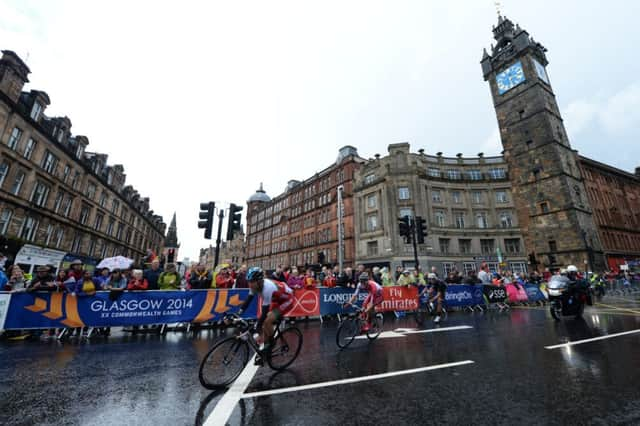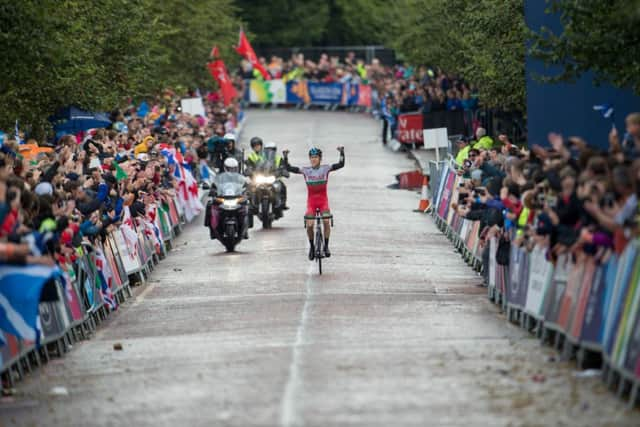Thomas wins Glasgow Commonwealth Games road race


But this was a race that didn’t really go the way anyone predicted. The weather became as important a factor as the twisty, technical course around the city centre and the West End, and the accumulated climbing – 7,200 feet in total, meaning that this was, in the words of Chris Boardman, “a climber’s race.”
If Millar couldn’t win it, and no other Scot could win it, there was one rider he would probably have chosen to take the gold medal. Geraint Thomas, the unsung hero of countless teams, for once cast aside his selflessness and showed off his formidable strength to win alone. And the way he celebrated on the finishing straight, tugging at his Wales jersey, making sure the cameras could see who he was representing, underlined what it meant.
Advertisement
Hide AdAdvertisement
Hide Ad“It’s massive for me,” said Thomas, who exactly seven days earlier was finishing the Tour de France in Paris. After three weeks riding in a supporting role around Yorkshire and France he was 22nd, his highest ever placing. Four days later, in the time trial in Glasgow, he won a bronze medal. “Riding the Tour before it adds to how good it is to get two medals,” Thomas continued. “I really didn’t expect it. To be honest I was coming out of national pride.


“I never really expected to medal. I thought [I’d] come here and race hard and enjoy the whole experience, of being part of the Welsh team, so to come here and get gold and bronze is more than I could have dreamt of.”
Conditions were atrocious. The rain was relentless: “apocalyptic” Millar called it. At one point, mid-race, it was announced that flights were being diverted from Glasgow Airport. But the riders rode on, proving more resilient than airplanes.
If Thomas was the hero of the second half, Peter Kennaugh was the man of the first. The Isle of Man rider, who, like Thomas, is a member of Team Sky, attacked after 3km and was out front alone for 113km. Eventually he was caught by three strong chasers: Thomas, New Zealand’s Jack Bauer and England’s Scott Thwaites.
It was a doomed move by Kennaugh, with his lead never more than two minutes, even as his team car (containing the injured Mark Cavendish) offered encouragement and replenishment. But perhaps it had a decisive effect on the race, forcing the Australians to chase. Since they had arguably the fastest sprinter in the race, in Mark Renshaw, the responsibility fell to them, and the others were grateful to follow. But they had bad luck when one of their strong riders, Rohan Dennis, crashed out, and when the decisive move did go they missed out completely.
The three at the front worked well together until, with 11km left, Thomas jumped, not on the steep climb of Montrose Street, where it was expected, but earlier, on the gradual rise of St Vincent Street. “I wanted to catch them by surprise because they are fast guys,” he explained. “I don’t have any acceleration at the moment: I am just a massive diesel engine.
“I needed to go early and try and get a gap and once you get a gap on those two they will start thinking about silver and bronze and not commit as much as I would. I was surprised they did not respond but everyone was tired and on their knees. I thought I would hit them early and luckily I had the legs until the line. I did not have the punch but I had the strength.”
But there were some heart-stopping moments when, with his lead around 50 seconds over the two chasers, Thomas punctured. “When I felt the front wheel going down words can’t express what I felt. I was swearing, saying what have I got to do? Fortunately I had a good gap and could press on but it felt like an eternity to get that wheel changed.” When he got going again he was still 20 seconds ahead – and he added another minute by the finish.
Advertisement
Hide AdAdvertisement
Hide AdTen minutes after Thomas’s triumphant arrival a sodden Millar appeared at the finish to huge cheers. He was 11th, but the fact that only 12 finished, from 139 starters, underlines what kind of race this was, and that everybody who finished deserved a medal, especially Kennaugh, who somehow held on for eighth. For Millar, finishing “was a matter of pride. When you’re in your national jersey, in your own country, you don’t stop. The other guys [in the Scotland team], their job was to help me, so they had every right to stop. But I was the leader. I’m not allowed to stop.”
Millar was certainly not downbeat. “Intense,” was his one word summary. “That was the stuff dreams are made of today. I don’t think [the result] really mattered, although I would have loved to have been at the front of the race. But that wasn’t realistic after not racing for five weeks. I realised two thirds in it wasn’t happening and I was getting weaker and weaker and that’s down to a lack of racing.
“Just to be out there and have the support was incredible,” Millar added. “The weather seemed to make no difference. There were moments of apocalyptic weather: the clouds came in and it was monsoon rain and yet it was still five deep with people cheering. I’ve never seen that before – usually they go and find somewhere to hide away, but not in Glasgow. It was a wonderful experience.”